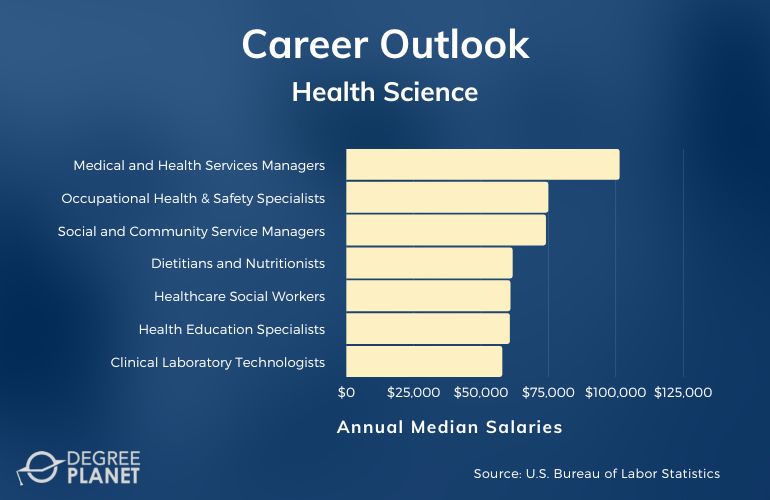Many think of a career in healthcare as being limited to doctors and nurses, but those who earn their masters in health science know that there are many more areas to explore in this important field.

Health sciences master’s programs can prepare you for a variety of roles that allow you to make an impact on the lives of those around you. Many health sciences grad students are interested in the administrative, research, or educational side of healthcare and health services.
Editorial Listing ShortCode:
Let’s take a look at how an online master’s degree in health science could help prepare you to begin or advance your career in healthcare.
Online Masters in Health Science Programs

Students who pursue masters degrees in health sciences often have an interest or experience in the field of healthcare and health science but do not wish to become doctors or nurses. In fact, there are many careers in the field of health sciences that require no or little interaction with patients, including becoming a teacher or health services administrator.
Other individuals wish to work directly with others in an educational capacity, devoting their career to increasing awareness through community outreach, occupational health, and social work. Some students use their knowledge toward development in areas such as health care policy and procedure, technology administration, and even health care research.
Editorial Listing ShortCode:
A masters in health science can also be helpful for those who wish to focus their career on ensuring adequate medical care in specific fields, such as:
- Nutrition
- Exercise and athletic training
- Gerontology
- Pediatric care
- Women’s health
- LGBTQA+ health
Those who earn their masters degrees in health sciences are generally not directly involved with patient care. The professional roles they hold, though, can help them increase awareness and keep communities safe and well through education, outreach, and the policies they establish.
Not all health science graduate programs focus on the same outcomes, as there are many different concentrations you can choose for your studies. You can read about each school’s offered programs and concentrations to determine which best fits your goals.
Online masters in health sciences programs can provide you with insight into the many roles that help support healthcare and medical science at the community, state, and even national level.
Common Online Health Science Master’s Degree Concentrations

The fields of healthcare and health sciences are very broad, so many schools offer a variety of concentrations that allow you to focus on the areas that can help you advance your career.
While the concentrations offered will be unique to each school, some common areas of specialization include:
- Administration. This concentration focuses on the business side of healthcare, including operational, financial, and leadership aspects of providing both private and public health.
- Community Health. With this concentration, you’ll learn how to provide and engage the public in healthy behaviors, and you’ll learn about strategic resource planning.
- Health Education. Those who follow this concentration may end up teaching healthy practices and behaviors in schools, clinics, private businesses, or nonprofit organizations.
- Nutrition. This concentration provides you with an understanding of how a person’s diet can influence their overall well-being.
- Gerontology. In this concentration, you can learn about health concerns that are of particular concern to the aging population.
It’s strategic to review course catalogs and program offerings to determine which school offers a concentration that aligns with your professional goals.
Health Science Careers & Salaries

The job opportunities available for graduates of Master of Health Science programs often depends on their chosen concentration and their experience level.
Some students prepare for roles as health educators at the grade school or collegiate level, including positions teaching health sciences to future generations. Others look toward the administrative side of healthcare, working to develop policies and procedures to improve health and wellness among a community.
According to the Bureau of Labor Statistics, here are some various career paths associate with advanced studies in health science.
| Careers | Annual Median Salaries |
| Medical and Health Services Managers | $101,340 |
| Occupational Health and Safety Specialists and Technicians | $74,870 |
| Social and Community Service Managers | $74,000 |
| Dietitians and Nutritionists | $61,650 |
| Healthcare Social Workers | $60,840 |
| Health Education Specialists | $60,600 |
| Clinical Laboratory Technologists and Technicians | $57,800 |
| Health Information Technologists and Medical Registrars | $55,560 |
| Athletic Trainers | $48,420 |
| Community Health Workers | $46,590 |
The concentration you choose will have an impact on the career options available to you with a master’s degree in health science.
The availability of jobs in healthcare administration, though, are anticipated to grow in the coming years. In fact, the Bureau of Labor Statistics projects 28% job growth for medical and health services managers over the next ten years, as health and wellness continue to be major areas of focus.
Editorial Listing ShortCode:
Some roles—such as that of an emergency services worker or dietician—are specific, but they can expand to include managerial and administrative roles within their field.
MS in Health Science Curriculum & Courses

Each of the master in health science graduate programs you explore will likely offer their own unique curriculum, which generally includes core classes and courses in your concentration.
Common core curriculum offerings tend to include courses such as:
- Current Issues in Health Science: In this course, you’ll take a look at contemporary challenges and opportunities in the field of healthcare and administration.
- Cultural Perspectives on Health: There are many ways in which an individual’s cultural and social experience can impact their attitude towards healthcare, as this course explores.
- Healthcare and Technology: This course explores the evolution of technology within the industry, from imaging to recordkeeping.
- Environmental Health: In this course, you’ll learn how an individual’s home, work, and community environment can impact their well-being.
- Women’s Health: This course focuses on the health concerns specific to the female population.
- Human Anatomy: You’ll explore the components of the human body as well as the various systems that help us thrive and survive.
- Ethical Concerns in Health Care: In this course, you’ll become familiar with the application of ethics when treating patients, working with families, and understanding their moral concerns.
- Historical Perspectives of Health Sciences: Understanding the history of healthcare practices and administration can provide you with insight into current issues, as this course explores.
- Policies and Procedures in American Healthcare: In this course, you can gain insight into the legal and ethical reasons behind our standing processes.
- Conflict Resolution in a Health Care Setting: This course prepares you for the workplace by helping you understand how conflict may occur and how to work through it.
Some health sciences master’s programs also require you to complete courses on leadership and health science writing to help prepare you for your professional career.
How to Choose an Online Health Science Masters Program

When it comes to choosing between master in health science graduate programs, there are several things you may want to keep in mind.
To start, you may wish to keep these factors in mind when evaluating online health science degree programs from various schools:
- How much is the program going to cost?
- Are there any in-person sessions or internships required in addition to online learning?
- Does the school offer a concentration that meets your professional goals?
- What type of career counseling or support does the school provide for graduates?
You may also wish to compare financial aid opportunities provided by each school. In addition, it’s strategic to verify that your prospective schools are regionally accredited.
Admissions Requirements

The admissions requirements vary from school to school, so it’s helpful to review each school’s admissions guidelines in detail. You may also schedule some time to speak with an admissions counselor.
Common admissions requirements often include:
- GRE or GMAT scores (only some schools require them)
- Official transcripts from all prior education
- Letters of recommendation
- Personal statement or letter of intent
- Resume and work experience
Some schools may also ask you to participate in an interview in order to get a feel for what you hope to accomplish in a health sciences master’s program.
Accreditation

It can be beneficial to pay particular attention to schools that have received regional accreditation. Credible regional accrediting agencies are recognized by CHEA, or the Council for Higher Education Accreditation. Schools can receive accreditation after they pass a thorough review of their educational standards and results. This can help you feel confident in the education you’ll receive from an accredited institution.
Editorial Listing ShortCode:
Many professional organizations and employers give preference to applicants who received their masters from an accredited school. Additionally, some licensing or certification boards require professionals to receive their education from an accredited institution.
Financial Aid and Scholarships

One challenge many students face is paying for their masters degrees in health sciences. If you’re looking for needs-based financial assistance, you could start by filling out and submitting the Free Application for Federal Student Aid (FAFSA). This will help determine your eligibility for federal aid.
While grants are not commonly given to graduate students, you may still qualify for student loans or work-study programs from the federal or state government. You may also wish to explore the scholarship and grant opportunities available through the school you select. Schools often provide financial awards based on scholastic accomplishment.
Additionally, you can see if your employer provides tuition reimbursement or a similar financial aid program, especially if you’re currently working in the healthcare field.
What Is an MSHS Degree?

A Master of Science in Health Sciences (MSHS) degree is designed to prepare you for a career in your chosen specialty. Those who seek a master degree in health science generally have experience and interest in the field of healthcare but do not wish to become a doctor or nurse.
Master in health science graduate programs provide the opportunity to learn more about how the healthcare industry works. Graduates might influence policies and procedures, educate future health sciences students, or gain footing for a career in a specific health-related field.
What Can You Do with a Masters in Health Science?

Master of Health Science programs are designed to help students advance their knowledge and qualifications in their chosen specialty area.
Common specializations include health administration, community and public health, health information systems, and specialty fields like nutrition or health issues pertaining to a certain population. For example, some graduates go on to become medical and health services managers, health education specialists, or health information technologists.
The Bureau of Labor Statistics indicates that the number of careers in medical and health services management is anticipated to grow much faster than average over the next ten years. After earning a masters degree, some graduates continue their educations is an online PhD in Health Sciences program that a growing number of universities now offer.
How Long Does It Take to Get a Master’s Degree in Health Sciences Online?

The length of time required to earn your master’s degree in health science depends on the program you select. For instance, if your program consists of 36 credit hours, you may be able to complete the program within 1 year, provided you remain enrolled full-time and year-round.
Editorial Listing ShortCode:
Programs that include a graduate thesis may require additional time to complete. Additionally, part-time enrollment will extend the amount of time it takes to earn your graduate degree in health sciences.
What’s the Difference Between Public Health vs. Health Science Master Programs?
There can be many differences as well as similarities between a public health master’s program and a master degree in health science.
| Masters in Public Health | Masters in Health Science |
|
|
In some cases, public health is offered as a concentration for a health science masters program, but it’s often a stand-alone degree for those who wish to become immersed in community and global health.
Is a Masters Degree in Health Science Worth It?

Yes, a masters degree in health science is worth it for many students. The Bureau of Labor Statistics projects 28% job growth for medical and health services managers over the next ten years, which is much faster than average.
The roles of the healthcare, wellness, and medical fields go far beyond the practitioners who heal and prescribe. From those who make healthcare policies to those who teach health class in grade school, health science professionals are an important part of helping inspire wellness in many populations.
Editorial Listing ShortCode:
Most masters programs in health science offer concentrations so you can tailor your studies to your preferred specialty area.
Universities Offering Online Masters in Health Science Degree Program
Methodology: The following school list is in alphabetical order. To be included, a college or university must be regionally accredited and offer degree programs online or in a hybrid format.

Excelsior University offers a fully online program for a Master of Science in Health Sciences. Students can specialize in General Studies, Public Health, or Cannabis Control. Core classes cover topics like ethical leadership, public policy, and informatics. Students may be able to transfer up to 18 approved credits from outside institutions toward the program’s 36 required credit hours.
Excelsior University is accredited by the Middle States Commission on Higher Education.

George Washington University offers a Master of Science in Health Sciences. The program has several concentration options, including Clinical Operations, Biomedical Informatics, Research Administration, and Healthcare Quality. All classes are housed entirely online. Students can potentially complete the program’s required credits in 30 months.
George Washington University is accredited by the Middle States Commission on Higher Education.

Johns Hopkins University offers a Master of Health Sciences in Population, Family, and Reproductive Health. This program is designed for students with at least 2 years of public health work or research experience. Most students can complete their studies in 1 to 3 years when attending classes part-time. The curriculum utilizes a 100% online learning format.
Johns Hopkins University is accredited by the Middle States Commission on Higher Education.

Liberty University offers a Master of Science in Health Sciences. The curriculum is designed to give students the knowledge and skills necessary to advance in their healthcare careers. Students can select specialties in Public Health, Nutrition, Human Biology, Exercise Science, and Human Performance. All classes meet fully online.
Liberty University is accredited by the Southern Association of Colleges and Schools Commission on Colleges.

Lock Haven University offers a 100% online program for a Master of Health Science. Studies in leadership and healthcare administration are at the core of the curriculum. The program is passionate about admitting students with diverse backgrounds across the healthcare sector. Students who attend classes full-time can typically complete the program’s 36 required credit hours in just 1 year.
Lock Haven University is accredited by the Middle States Commission on Higher Education.

Northern Illinois University offers a Master of Science in Health Science. This program may be an excellent fit for students pursuing leadership in health-related organizations, education, medical centers, or laboratories. This program is held entirely online. The curriculum emphasizes interdisciplinary communication, evidence-based analysis, culturally aware leadership, and the provision of quality health services.
Northern Illinois University is accredited by the Higher Learning Commission.

Saint Francis University offers a Master of Health Science. Students can choose between Clinical, Generalist, Health Education, and Health Leadership specialty tracks. The program may allow incoming students to transfer in up to 6 of their 30 required credits from outside institutions. Students can attend classes online and have around-the-clock access to coursework.
Saint Francis University is accredited by the Middle States Commission on Higher Education.

Trident University International offers a 100% online program for a Master of Science in Health Sciences. The program aims to instill students with collaboration, innovation, and critical-thinking skills that are foundational to the discipline. Courses cover topics like research methods, public health policy, diversity in healthcare, and health promotion. Students must complete a minimum of 40 credit hours to graduate.
Trident University International is accredited by the Higher Learning Commission.

The Master’s in Medical Sciences program at the University of South Florida offers a concentration in Health Sciences. This interdisciplinary program incorporates principles from anatomy, biochemistry, microbiology, pathology, genetics, and physiology. Most students can complete their required credits in just 4 semesters. The program’s flexible online learning format is designed with working professionals in mind.
The University of South Florida is accredited by the Southern Association of Colleges and Schools Commission on Colleges.

Western Carolina University offers a Master of Health Sciences. Students interested in pursuing leadership roles in the healthcare sector may find an ideal next step in this program. Students can choose specialties in Emergency Medical Care, Health Education, Nutrition, and Health Management. Regardless of the concentration chosen, all classes can be attended fully online.
Western Carolina University is accredited by the Southern Association of Colleges and Schools Commission on Colleges.
Getting Your Masters in Health Science Online

If you’re interested in learning how you can impact health and wellness in your community or around the world, it may be time to consider getting your masters in health science online.
Health and wellness is important to every human being, and health educators, administrators, managers, and more are all important to the healthcare industry. Earning your online masters in health science degree may help you grow personally as well as professionally.
You can take a look at some of the graduate programs offered by accredited schools to see which ones best match your interests and goals.

